Hong Kong Yearbook on Sustainable Development (1997-2017)
2017-08-07GoldenBeeadmin0010
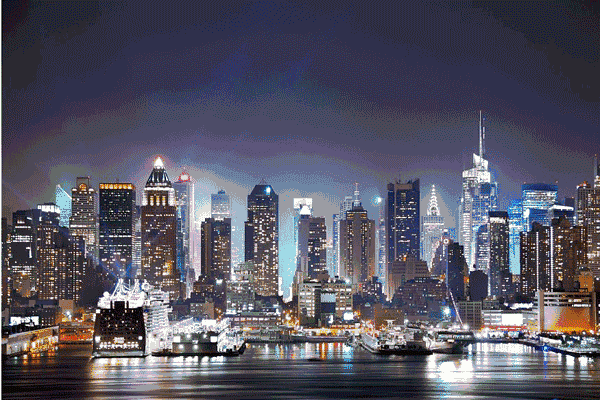
On July 1, 1997, twenty years ago, Hong Kong returned to the embrace of the motherland in a heavy downpour. The Hong Kong Special Administrative Region (HKSAR) of the People's Republic of China was officially established.
The past twenty years is an extraordinary course of practice, exploration and arduous endeavor. Twenty years after its return has witnessed Hong Kong's contribution to the mainland's reform and opening-up, economic and social development strategies, especially the outstanding results in leading, exploring and carrying out social responsibility and sustainable development.
On this special occasion, as we celebrate China's rejuvenation and express our national pride, GoldenBee introduces you with a column to commemorate the 20th Anniversary of Hong Kong's Return—Hong Kong Yearbook on Sustainable Development (1997-2017). Sixty CSR events are presented in chronological order, like an unfolding picture scroll, to tell the twenty years of twists and turns in Hong Kong's sustainable development.
HK has early introduced, practiced and integrated into the concepts of sustainable development and social responsibility; the officials of HKSAR government have repeatedly advocated social responsibility; sustainable development has been integrated into people's ways of consumption and life... While the sustainable development in Hong Kong has yielded remarkable results, it still needs to further promote the communication and exchanges of sustainability with the Mainland counterpart.
In retrospect of the past hundreds of years, Hong Kong and the motherland have shared weal and woe, and, the cause of sustainable development.
CSR Yearbook
1997
In 1997, the CLP Group started to release report to disclose information on environment and safety. It is the first Hong Kong enterprise to provide corporate documents on environment annually.
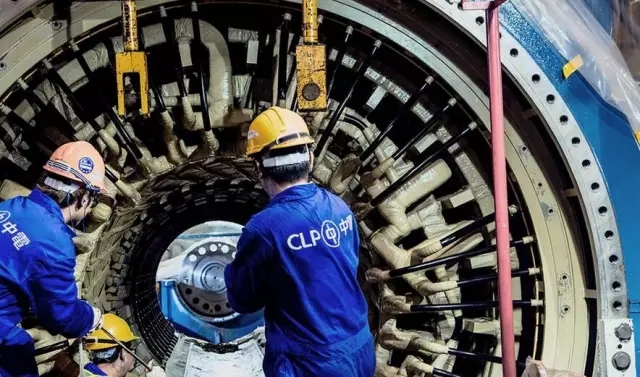
1999
In 1999, Tung Chee-hwa, then the Chief Executive of the HKSAR, listed sustainable development as top priority of the government in his policy address for the first time.
2000
On March 7, during the National People's Congress and the Chinese People's Political Consultative Conference, the Hong Kong representative Fan Hsu Lai Tai, reported to Li Peng, then the Chairman of the Standing Committee of the National People’s Congress, on how to strengthen environmental protection and achieve sustainable development while fueling economic growth.
On April 19, Mrs. Selina Chow, the Chairman of the Hong Kong Tourist Association, signed an environmental protection charter with representatives of Hong Kong's aviation, catering and hotel industries to support the Environmental Protection Strategy for Hong Kong's Sustainable Development in Tourism and Travel Services.
2001
On April 16, news reported that Hong Kong's seawater toilet flushing system won the British Environmental Protection Award.
On September 1, the Environmental Protection Department of the HKSAR launched a Proposal to Ban Idling Vehicles with Running Engines, calling on drivers to shut down the engine while waiting to park.

On November 2, Hong Kong's first exhibition hall with a collection of the latest intelligent and environmentally-friendly high-tech achievements was officially completed.
2002
In 2002, the Hong Kong Council of Social Service launched a Caring Company Program to promote business-society partnership, and encourage companies and public organizations to care for the community, employees and the environment.
In 2002, Yau Tse-wai, a student from School of Art, Chinese University of Hong Kong, initiated a Clean Clothes Campaign, hoping to improve treatment of workers through concrete actions, and expose Disney sweatshops in China.
2003
In March, the Council for Sustainable Development was established in Hong Kong. It has two main tasks: first, to formulate HK's first sustainable development strategy through the first round of social participation; second, to select new priorities for another round of social participation.
On March 1, the HKSAR government set up a fund worthy of HK $ 100 million to finance sustainable development and related research.
2004
On June 1, the Hong Kong Footprint organized the world's first No Air-conditioning Day activity.

In July, Hong Kong's Council for Sustainable Development issued Sustainable Development: Making a Choice for Our Future, analyzing and elaborating on key issues, such as developing renewable energy in Hong Kong.
On July 15, Hong Kong published its first consultation document on sustainable development.
On October 17, the Environmental Protection Department of the HKSAR and the Ministry of Environmental Protection of the People's Republic of China launched an exchange program for environmental protection personnel, which was the first time of this program between the two parties.
2005
On January 31, the HKSAR government officially launched the Online Resource Center for Sustainable Development.
On March 15, the Hong Kong Consumer Council issued the Guidelines on Good Corporate Social Responsibility to encourage the business community to adopt and introduce twelve business principles, including protecting consumer privacy, to enhance business credibility and boost consumer confidence.
On May 24, the HKSAR government issued a report: The First Sustainable Development Strategy for Hong Kong, marking the first step towards Hong Kong’s goal of sustainable development.
On June 5, the Hong Kong Environmental Protection Association and the Environmental Protection Department organized "Fresh Air and Comfortable City" environmental protection activity.
On June 14, ten SMEs committed to CSR and environmental protection won the SMEs New Power Incentive Program Award.
2006
In 2006, the second round of social participation of the Hong Kong Council for Sustainable Development was about "population policy", but there was little about the coordination with the Mainland, especially with the Pearl River Delta, in formulating sustainable development strategies.
2007
On February 8, a survey by Institute for China Business, HKU SPACE showed that 70% of the respondents (organizations) were committed to fulfill CSR, but only 50% drafted relevant policies.
In September, the HSBC global climate change benchmark index and four available global climate change indexes were officially launched as a climate change index series. It is the first time that the stock performance of companies benefiting from addressing climate change was tracked.
On September 12, at the opening ceremony of the 2007 Hong Kong Forum on Corporate Social Responsibility, Mr. Tsang Chun-wah, then the Financial Secretary, said that the concept of CSR should be systematically promoted to improve Hong Kong’s life quality and overall development.
On November 26, an investigation group formed by seven colleges and universities in Hong Kong accused Dell of being a "sweatshop", and launched a campaign to boycott Dell's computer, excluding it from student computers purchase list of Hong Kong colleges and universities.
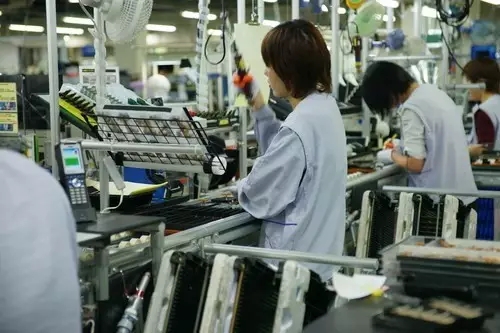
2008
On February 1, the 2008 Hong Kong Awards for Environmental Excellence was officially launched. Participants could obtain an "environmental protection mark" if they meet the preset number of the established environmental objectives.
In April (Partnership Program), the Hong Kong Environmental Protection Department and the Economic & Information Commission of Guangdong Province launched the Cleaner Production Partnership Programme.
On November 19, in face of Hong Kong's massive layoffs, Mr. Donald Tsang, then the Chief Executive, said that Hong Kong enterprises should shoulder social responsibility to reduce the trauma caused by downsizing.
On December 18, the world's first World Company Charter and action plans to promote corporate social responsibility were released in Hong Kong. It made clear the eight principles and ten action plans for promoting CSR, and issued the CSR management system CSR 9000.
2009
On February 11, Mr. Tsang Chun-wah, then the financial secretary of Hong Kong, said that enterprises should fulfill CSR, and should not downsize unless absolutely necessary.
On May 21, facing the endless layoff and wage cut, the Legislative Council of the HKSAR passed a motion urging enterprises to fulfill CSR and take the interests of the community as a whole into account.
On September 25, a survey of the Hong Kong Federation of Youth Groups showed that young people not only grew their patriotism, but also agreed that they should shoulder national responsibility. Nearly 80% of them were confident to have the ability to drive changes.
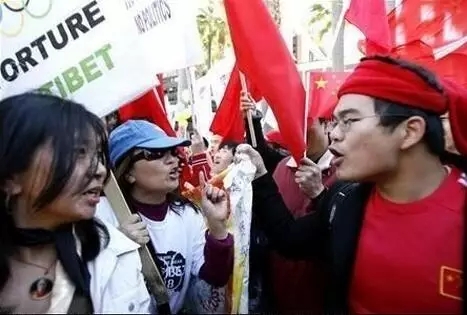
On November 24, Hong Kong held a low-carbon Christmas lighting ceremony, calling on the public to help achieve the goal of reducing carbon emissions by one million tons.
2010
In 2010, the Hong Kong Productivity Council hosted the first Hong Kong Corporate Citizenship Program to promote public awareness of corporate citizenship and encourage enterprises to build civic duty values.
On July 26, the Hang Seng Indexes Company Limited issued the Hang Seng Corporate Sustainability Index Series.
On November 9, College of Business, City University of Hong Kong announced to integrate "social responsibility" into its training program to elevate college students' employability.
2011
On 13 January, Mr. Edward Yau, the Secretary for the Environment of the HKSAR, urged new measures be taken on waste management and reduction.
On May 11, the 2011 Corporate Social Responsibility Forum of Chinese University of Hong Kong was held at the Hong Kong Convention and Exhibition Center.
In June, the Hong Kong Council of Social Service issued the CSR Guide for SMEs in Hong Kong to encourage Hong Kong SMEs to focus on social and environmental protection measures and integrate them into business strategies to upgrade CSR.
2012
On January 17, Daily Mirror's first Outstanding Corporate Social Responsibility Award Ceremony was held in Hong Kong.
On February 22, the Hong Kong SME Business Sustainability Index was released for the first time. The results indicated that SMEs in Hong Kong were still at a start stage of sustainable development, scoring only 58 on a 1 to 100 scale.
From November 13 to 14, the first University Social Responsibility Summit was held at Hong Kong Polytechnic University. The summit was also one of the major highlights of the 75th anniversary ceremony of the university.
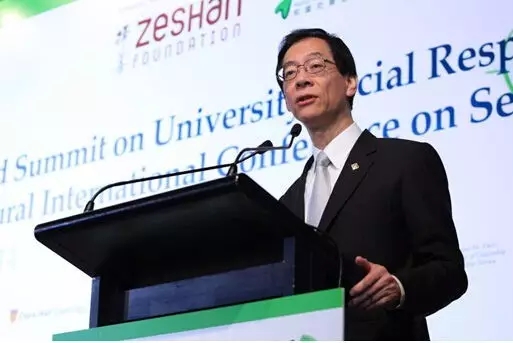
2013
On February 5, Hong Kong Baptist University advocated to establish a responsible consumer index.
On June 17, when attending the launching ceremony of the Fourth Hong Kong Enterprise Citizenship Plan, Mr. Cheung Kin-chung, then the Secretary for Labor and Welfare of the HKSAR government, said that to fulfill CSR should start from caring for employees.
2014
On March 21, Mr. Leung Chun-ying, then the Hong Kong's Chief Executive, said that a better future of Hong Kong required the support of big and small enterprises by fulfilling CSR.
From September 16 to 17, the CSR Asia Summit 2014 and its 10th Anniversary was held.
In 2014, Shenzhen Economic Daily reported that Hong Kong Polytechnic University would include social services in its compulsory courses.
2015
On April 1, Hong Kong fully started charging for plastic bags. The retail outlets covered by this plan increased from over 3,000 to about 100,000.
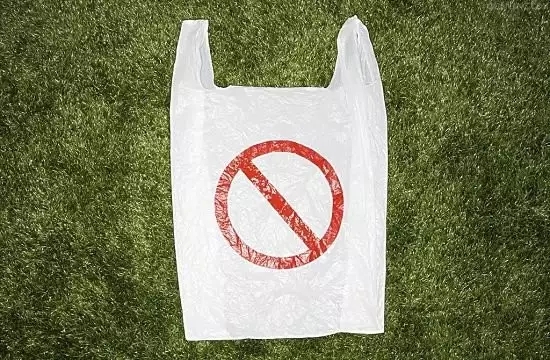
On May 14, the Environment Bureau of the HKSAR released the first Hong Kong Urban Energy Conservation Roadmap 2015-2025 + to set a new target for Hong Kong, reducing energy intensity by 40% by 2025.
On October 16, eleven world-famous universities at home and abroad, including Hong Kong Polytechnic University, Cambridge University, Peking University, Sichuan University, Kyoto University, set up a University Social Responsibility Network to promote the social responsibility of university, and build a better world.
In October, the Environmental Protection Department of the HKSAR government officially set up a recycling fund of RMB one billion, aiming to help improve operational capacity and efficiency of the recycling industry and push forward its sustainable development to promote waste recycling and reuse.
On December 1, the Hong Kong Business Sustainability Index was launched and the results showed that the CSR of listed companies in Hong Kong was still at an exploration stage.
On December 21, the Stock Exchange of Hong Kong completed revising the Environmental, Social and Governance Reporting Guide (ESG Guide), which requires all listed companies in Hong Kong to publish Environmental, Social and Governance Report according to the revised ESG Guide from the financial year 2016.
2016
On July 26, the Commission for Sustainable Development published a public participation document on promoting the sustainable use of biological resources.
From September 21 to 27, the first Hong Kong International Philanthropy and Social Enterprise Week ("IPSE Week") was held in Hong Kong.
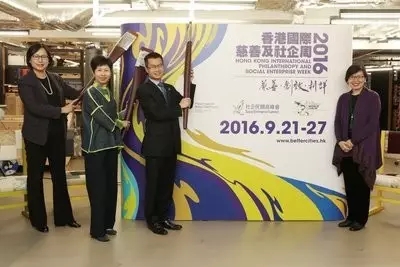
On October 20, the China Global Philanthropy Institute and Oxfam Hong Kong officially launched the Mainland China —Hong Kong Philanthropy Platform in Beijing to promote exchanges and cooperation among charities and philanthropists.
On November 15, the Hong Kong Economic Development Council said it would urge Hong Kong to become a cosmopolitan with a competitive edge in sustainable development.
2017
On May 26, the leading Chinese enterprise in green building, Landsea Group (Real Estate) released its first CSR report in Hong Kong.
On May 9, the United Nations Economic Commission for Europe hosted a PPP International Forum on the theme of Implementing the 2030 United Nations Sustainable Development Program through Human-centered and Effective PPP Practice in Hong Kong.
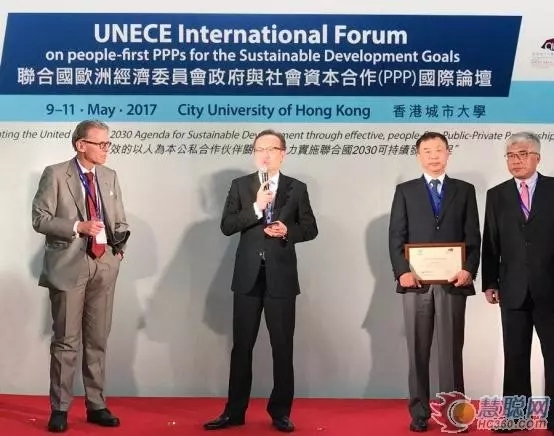
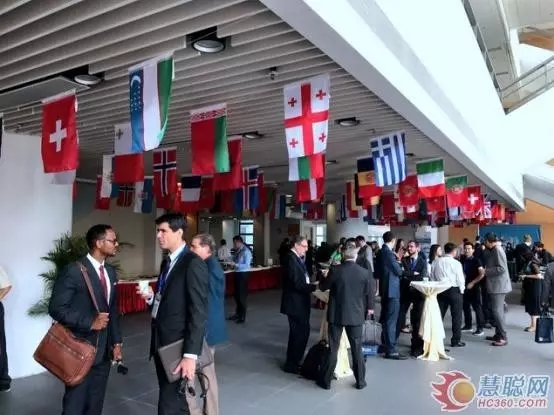
From June 5 to 7, the World Sustainable Built Environment Conference 2017 Hong Kong was held to discuss sustainable development strategies and practical solutions to transform our built environment.
Best Practices
- The 100-year brand — Air Liquide also has a sense of juvenile
- Beijing Public Transportation Corporation: Developing green transportation to build a harmonious and livable capital
- CGN: Building a modern factory in barren deserts and developing a new win-win cooperation model along “Belt and Road”
Upcoming Event

All the materials on the site “Source: XXX (not from this site)” have been reprinted from other media. They do not imply the agreement by the site.
All the materials with “Source: CSR-China Website” are the copyright of CSR-China Website. None of them may be used in any form or by any means without permission from CSR-China Website.
GoldenBee Official WeChat
Copyright © Csr-china.net All Right Reserved.
京ICP备19010813号










